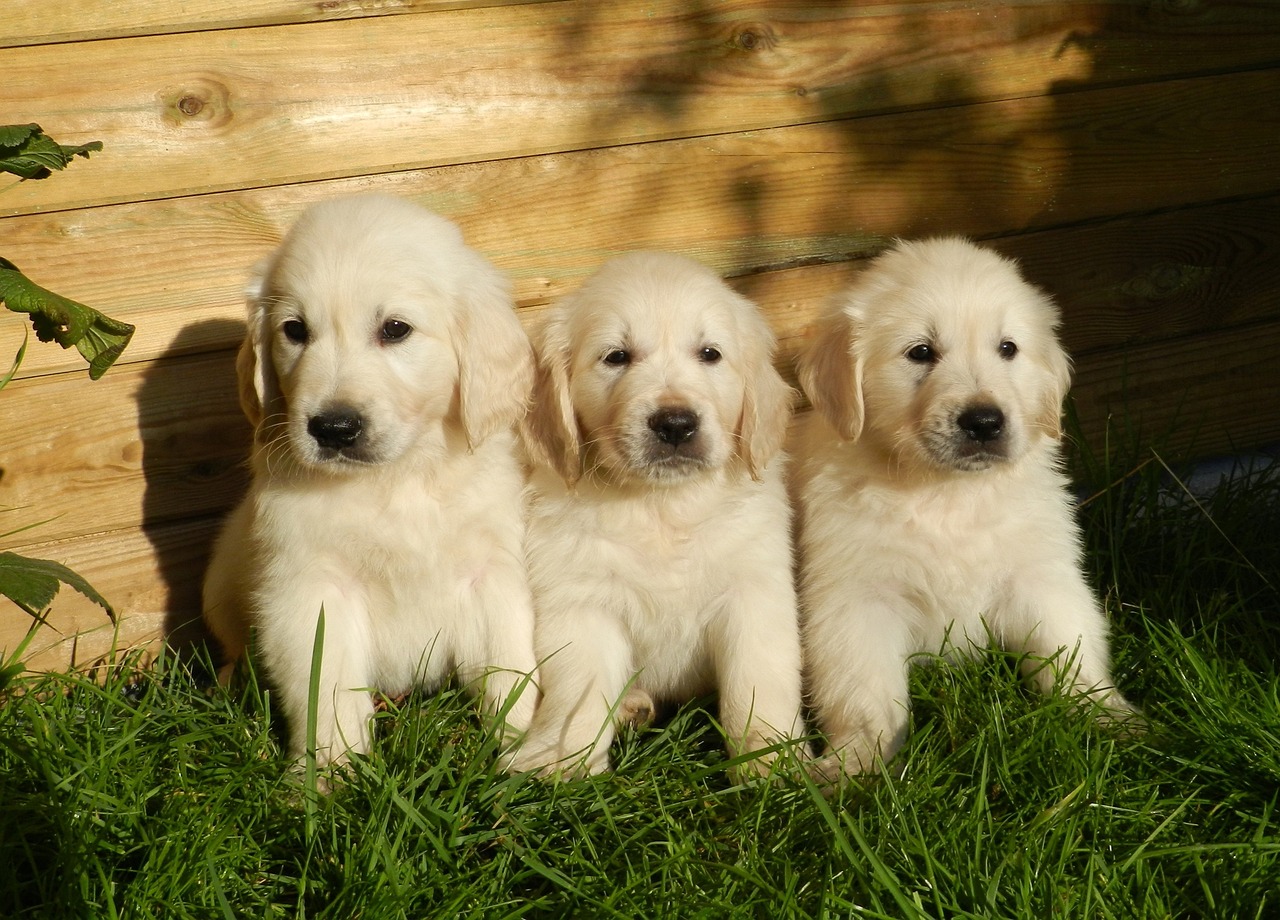Key Takeaways
Golden Retriever puppies have a critical socialization window from 3 to 14 weeks old, where positive experiences with people and other dogs are crucial.
Early socialization includes exposure to various environments, sounds, and gentle handling to build confidence.
Introduce your puppy to new people and dogs in controlled, positive situations to foster good social skills.
Use positive reinforcement techniques, like treats and praise, to encourage friendly behavior and ease any fear or aggression.
Monitor body language and interactions closely to ensure safe and enjoyable experiences for your Golden Retriever puppy.
Unlocking the Joy of Your Golden Retriever’s Social Journey
As the proud companion of a Golden Retriever puppy, you hold the key to unlocking a world of joyful and fulfilling social experiences for your furry friend. Socialization isn’t just about playdates; it’s about setting the foundation for a confident, well-adjusted, and happy dog. Let’s dive into the heart of socialization and ensure your Golden Retriever pup blossoms into the sociable and friendly adult dog they’re destined to be.
Why Social Skills Matter for Puppies
Imagine walking your dog in the park, watching them confidently approach other dogs and people with a wagging tail and friendly demeanor. That’s the goal of socialization. It’s more than just learning to be around others; it’s about building the skills to interact positively with the world. A well-socialized puppy grows into a dog that’s comfortable with new experiences, which means less stress for both of you in the long run.
Golden Retrievers: A Breed Built for Sociability
Golden Retrievers are renowned for their friendly and tolerant nature, but even they need guidance to learn the ropes of canine etiquette. By nature, they’re eager to please and enjoy companionship, which makes them great candidates for socialization. Remember, their sociable nature is a double-edged sword; without proper socialization, their enthusiasm can turn into overexcitement or timidness.
“to Socialize a Golden Retriever Puppy …” from iheartdogs.com and used with no modifications.
First Impressions: The Critical Socialization Window
Understanding the Socialization Window
The early weeks of a puppy’s life are like the opening of a window to the world. From 3 to about 14 weeks old, puppies are especially receptive to new experiences, and the encounters they have during this time can shape their perceptions for life. This period is a golden opportunity—no pun intended—to introduce your pup to a variety of sights, sounds, and smells in a positive way.
Early Socialization Goals and Techniques
So, what should you aim for during this critical window? Your mission is to gently expose your Golden Retriever puppy to a broad range of experiences. Here’s how:
Handle your puppy regularly, touching their paws, ears, and mouth, so they become comfortable with future grooming and vet visits.
Introduce them to different types of people, including children, men, women, and people wearing hats or uniforms, to prevent fearfulness.
Expose them to various household noises like vacuum cleaners, washing machines, and doorbells, so they learn to stay calm amidst daily activities.
Most importantly, all these experiences should be positive. Pair new encounters with treats, play, and praise to create pleasant associations.
Playing Nice: Dog-to-Dog Introductions
Introducing your Golden Retriever puppy to other dogs is a delicate dance that requires patience and attentiveness. It’s essential to start these introductions slowly and in controlled environments. Begin with dogs that you know are well-behaved and vaccinated, to ensure a safe and positive experience for your puppy.
When it comes to dog-to-dog introductions, always keep your puppy on a leash and allow them to approach the other dog in their own time. Watch their body language closely; a relaxed body and a wagging tail are good signs. If either dog shows signs of stress or aggression, calmly separate them and try again later. Positive experiences are crucial, so keep initial encounters short and sweet.
Remember to praise and reward your puppy after a successful interaction. This reinforces their good behavior and makes them look forward to the next friendly meet-up. By doing this consistently, you’re teaching your puppy that making new friends is both fun and rewarding.
For example, the first time I introduced my Golden Retriever puppy to another dog, I made sure it was with an older, calm dog. The meeting took place in a quiet park, and after a few sniffs and tail wags, they were playing as if they’d known each other for years. The positive outcome set the stage for my puppy’s future dog interactions.
Education in Action: Training Tips for Social Skills
Training your Golden Retriever puppy’s social skills is an ongoing process that involves consistency and positive reinforcement. It’s not just about meeting new friends; it’s also about learning the dos and don’ts of polite dog behavior.
One effective way to teach your puppy social skills is through structured playdates. Arrange for your puppy to meet with other dogs in a safe, enclosed area where they can interact off-leash. Supervise these playdates closely, and intervene if play gets too rough or if one dog seems overwhelmed. This controlled setting allows your puppy to learn appropriate play behaviors and develop good doggy manners.
Positive Reinforcement: The Golden Rule
Positive reinforcement is the cornerstone of effective dog training. It’s about rewarding the behaviors you want to see more of, which encourages your puppy to repeat those behaviors. In the context of socialization, this means rewarding your puppy with treats, praise, or play whenever they display friendly and appropriate interactions with others.
Navigating Social Challenges
Despite your best efforts, your Golden Retriever puppy might encounter social challenges. They might feel scared or show signs of aggression towards other dogs or people. It’s crucial to address these issues early on. For practical advice on managing and improving your dog’s behavior in public spaces, consider exploring these urban dog exercise tips.
For a fearful puppy, introduce new experiences at a pace they can handle, always pairing new encounters with positive reinforcement. If aggression is the issue, seek help from a professional dog trainer to address the behavior before it becomes ingrained.
Safe and Sound: Managing Golden Retriever Interactions
Monitoring Playtime and Body Language
As your Golden Retriever puppy meets new canine companions, you’ll need to become a keen observer of dog body language. Playtime should be monitored to ensure it remains friendly and doesn’t escalate into aggression. Look for loose, wiggly body movements, which typically indicate a relaxed and happy dog. Stiff, still bodies, on the other hand, can be a sign of discomfort or aggression.
It’s also important to listen to the sounds your puppy and their playmates make. Playful barks and growls are normal, but if these sounds intensify or change in tone, it’s time to intervene.
When to Step In: Teaching Boundaries
Knowing when to step in and correct your puppy is as important as letting them explore social interactions. If your puppy is being too rough or isn’t respecting the other dog’s signals to back off, it’s your job to step in. Use a calm voice to call your puppy away, and give them a moment to settle down before trying again.
Step in if your puppy is not responding to the other dog’s cues to stop.
Interrupt play if it becomes too intense or if one dog seems overwhelmed.
Use these moments as teaching opportunities to instill good manners in your puppy.
By setting clear boundaries and being consistent with your interventions, you’ll help your Golden Retriever understand the limits of acceptable behavior and ensure they remain a polite and friendly playmate.
Beyond Puppies: Continuing Socialization into Adulthood
Golden Retrievers are social by nature, but socialization doesn’t end with puppyhood. As your dog matures, it’s important to maintain and expand their social experiences. Continue to introduce them to new dogs, people, and environments. This ongoing socialization helps prevent the development of fears and phobias, and keeps your dog well-adjusted and confident.
Attend dog-friendly events, visit dog parks, and consider enrolling in advanced training classes. These activities not only reinforce social skills but also provide mental stimulation and physical exercise, which are key to a Golden Retriever’s overall well-being.
Adult Golden Retriever Social Needs
Continuing socialization for your adult Golden Retriever is as crucial as it was during their puppy days. Adult dogs still need to meet new friends, explore new places, and have new experiences to maintain their social skills and adaptability. Keep the momentum going by regularly arranging playdates, visiting dog parks, and exposing your adult Golden to a variety of people and environments.
Maintaining Social Engagement Throughout Life
Golden Retrievers thrive on interaction and it’s important to keep them engaged throughout their lives. Whether it’s through ongoing training classes, dog sports, or community events, these activities provide valuable opportunities for your dog to socialize while keeping their mind and body active. Remember, a socially engaged Golden is a happy Golden.
Don’t forget the simple joy of a daily walk in a new neighborhood or a hike on a different trail. Variety is the spice of life, and it applies to your dog’s social activities too. The more positive interactions they have, the more well-rounded and content they’ll be.
FAQ
Let’s tackle some common questions about socializing Golden Retriever puppies to help you navigate this essential aspect of their development.
What is the best age to start socializing my Golden Retriever puppy?
The best age to start socializing your Golden Retriever puppy is as soon as they come home with you, typically around 8 weeks of age. The socialization window is most open between 3 to 14 weeks, so it’s important to begin exposure to new experiences during this time while continuing to socialize throughout their life.
Keep in mind that your puppy should be vaccinated before interacting with unknown dogs or visiting places where many dogs have been. Always consult with your vet about the best time to start socializing your puppy outside your home.
How often should my puppy interact with new dogs and people?
Your puppy should have regular interactions with new dogs and people. Aim for several positive experiences each week, gradually increasing the frequency and variety of encounters as they grow older and more comfortable. This can include playdates, visits to pet-friendly stores, and walks in the park.
It’s also important to ensure that these interactions are controlled and positive, so your puppy learns to associate new experiences with good things. Keep sessions short and sweet to avoid overwhelming them.
What do I do if my puppy seems scared or aggressive during socialization?
If your puppy appears scared or aggressive, it’s essential to address their fear or aggression calmly and promptly. First, remove them from the situation to prevent any negative experiences. Then, slowly reintroduce them to similar scenarios in a more controlled and less threatening manner, always paired with positive reinforcement.
If the issue persists, consider enlisting the help of a professional dog trainer or behaviorist. They can provide guidance tailored to your puppy’s needs and help them overcome their fears or aggression.
Can socialization still be successful for older Golden Retrievers?
Absolutely! While early socialization is key, it’s never too late to work on social skills. Older Golden Retrievers can still learn to be more comfortable and confident around new dogs, people, and environments. The approach might require more patience and sensitivity to their established habits, but with consistent positive experiences, older dogs can make great progress.
Start with less challenging situations and gradually build up to more complex social scenarios. And just like with puppies, using treats and praise can help create positive associations.
How do I balance my Golden Retriever’s social life with training and rest?
Balancing your Golden Retriever’s social life with training and rest is about finding a rhythm that works for both of you. Schedule regular times for social activities and training, but also ensure your dog has plenty of downtime to relax and recharge. Pay attention to your dog’s signals; if they seem tired or stressed, it’s okay to take a break and just enjoy some quiet time together.
Training can be incorporated into social situations as well, making it a part of the fun rather than a separate task. And remember, quality trumps quantity. A few meaningful and positive social interactions are more valuable than a packed schedule that leaves your dog overwhelmed.
Training your Golden Retriever can be a fun and rewarding experience, especially when it comes to socialization. It’s important to expose them to different environments and situations to help them develop good manners and become well-adjusted pets. Taking your pup to a local dog park can be a great way to let them interact with other dogs and people, which is crucial for their social development. Remember to start slow and always supervise your dog to ensure they are playing nicely and not getting overwhelmed.






